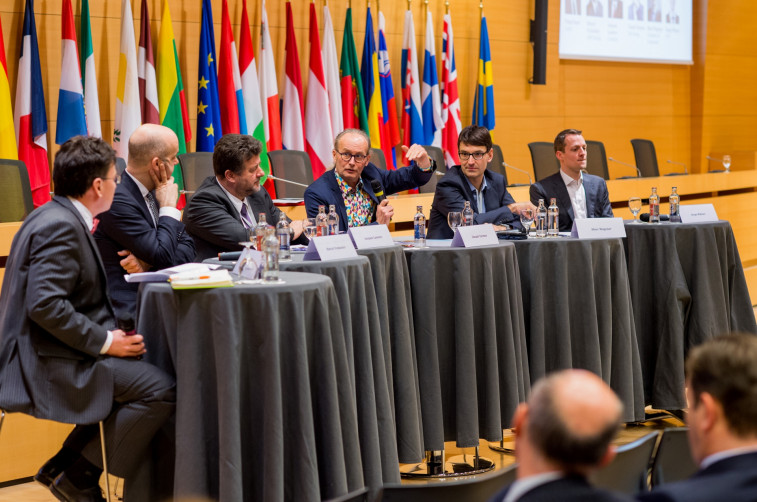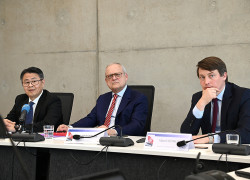Spotlight on sustainable growth
Tomorrow’s economic growth was the focal point of the 12th Journée de l’Économie
Qualitative growth and increased productivity and innovation: these were the topics discussed on 22 March at the 12th Journée de l’Économie, organised by the Ministry of the Economy, the Luxembourg Chamber of Commerce and FEDIL – The Voice of Luxembourg’s Industry, in cooperation with PwC Luxembourg. Against a backdrop of constant transformation and driven by disruptive technologies, there is an increasingly pressing need to rethink our current business models, both across Europe and – more specifically – in Luxembourg. This nationwide event brought together public- and private-sector economic players determined to cooperate in shaping tomorrow’s economic growth. They came to discuss the concrete steps needed to get there. Read on to find out what we learned at this year’s Journée de l’Économie.
A growth model based on increased productivity
Sustainable, qualitative, inclusive, intelligent: there are a multitude of adjectives to describe the growth needed in Luxembourg for it to move from its current growth strategy – which is over-reliant on resources – to a more qualitative and productive model. This topic prompted lively debates and presentations at the latest Journée de l’Économie. In his welcome speech, Carlo Thelen, Director General of the Luxembourg Chamber of Commerce, said that now was the best time for the country to embark on this paradigm shift. This transformation will enable us to use our resources more intelligently, in particular by taking advantage of digitisation, thus achieving considerable productivity gains. As for what is needed to make this transformation a success, Carlo Thelen believes that the answer is strong partnerships between the public and private sector, especially involving stakeholders who have experience of the “Rifkin process”. In addition, to transition successfully to more qualitative growth, we need to open up our economy and show a desire to integrate digital into all of our business sectors.
Managing social tension caused by globalisation and a rapidly changing global economy
Marcel Fratzscher, President of DIW Berlin (Deutsches Institut für Wirtschaftsforschung), Professor of macroeconomics and finance at Humboldt-University Berlin and member of the advisory board to the German Ministry of the Economy, kicked off the Journée de l’Économie by presenting an overview of global economic viewpoints, which are positive if you reason in pure economic terms. Nevertheless, according to the German economist, the current geopolitical and social context is causing our society to become increasingly polarised, leading to three major risks, known as the “three Ps”: the growth of populism, protectionism and paralysis – which is manifesting as a lack of structural reform. Professor Fratzscher also raised the question of sovereign debt in European Union Member States, saying that while it is not a major immediate threat, it may harm future economic growth by limiting governments’ margin for manoeuvre. In addition to a certain number of structural reforms to be carried out at EU level, the challenge will be to find answers to the causes of polarisation. This response cannot come from the public sector alone: the private sector must play a role too.
Governments create innovation rather than regulate
Mariana Mazzucato, Professor in the Economics of Innovation and director of the Institute for Innovation and Public Purpose, University College London (UCL) and an advisor to the European Commission, gave a lively and impassioned speech, highlighting the vital role that the public sector plays in innovating to foster economic growth. She took the opportunity to dispel certain stereotypes that are often laid at the feet of government. According to the Italian-American economist, governments are too often regarded as hostile to innovation and as having the sole objective of closing loopholes in the market through regulation, subsidies, aid and risk management. But in reality, governments (especially in the United States) have invested more than you might think in various technologies that are now part of everyday life, such as GPS technology and smartphone touchscreens. Therefore, thanks to its ability to take risks and establish new markets, the public sector has a role to play in creating sustainable growth. To be able to reach this objective, Mariana Mazzucato supports the theory that the public sector will have to approach growth by creating an organisational structure through “missions” to determine sustainable strategic goals and transform them into concrete actions. Obviously, implementing such a structure is a disruptive process, a key part of which is recruiting public officials. Thus, governments must find a co-investment strategy, rather than settling for the role as mere providers of aid and subsidies.
The private sector’s crucial role in defining a sustainable capitalist model
How does the private sector influence transformation to qualitative growth and how can it contribute to boosting this growth? John Parkhouse, CEO of PwC Luxembourg, is convinced of the answer: the private sector has a profound responsibility towards all stakeholders in society. Citing data from the latest CEO Survey, PwC’s annual study into the morale of CEOs worldwide, he stated that the respondent CEOs seemed confident about the future economic outlook. However, this optimism faltered when they were asked about the long-term future of their business. According to John Parkhouse, the divided world in which we are evolving is giving rise to a major issue: ordinary citizens are losing ever more trust in political institutions and the media. In this context, the private sector has a vital role to play: creating shared value among all of society’s stakeholders. To do this, businesses must become aware of the importance of putting social responsibility at the heart of their strategies, so that they can inspire everyone in their community. This is the only way to ensure the long-term survival of the capitalist system – and thus, businesses. It is done by successfully transitioning from a growth based on maximising short-term profit to one that considers longer-term sustainability issues at every step. John Parkhouse used his conclusion as a reminder: “A healthy business needs a healthy society, just like a healthy society needs healthy businesses.”
Fostering sustainable growth doesn’t mean slowing growth down!
This is the opinion of Etienne Schneider, Luxembourg’s Deputy Prime Minister and Minister of the Economy, who stated that Luxembourg’s growth must be able to benefit absolutely everyone. The quest for growth at any cost must not become an end in itself, but must instead lead to the growth that is necessary in Luxembourg. Qualitative growth must be based on a certain coherence, which is currently the subject of debates surrounding implementation projects (as can be seen in some national projects). This is why, in his speech, the Minister of the Economy reminded the audience of the importance of the “Third Industrial Revolution” project (inspired by a model developed by American economist Jeremy Rifkin) for more sustainable growth when setting up a dialogue between society’s various stakeholders. To finish, Etienne Schneider added that digitisation, artificial intelligence and the circular economy were the perfect ingredients for generating significant productivity gains. These gains have the potential to ensure long-term, durable, self-sustained growth in Luxembourg.
The country’s growth was debated by a panel led by Serge Allegrezza, Director of STATEC and the Observatory for Competitiveness. The panel, which included representatives from research, the private sector and politics, debated the benefits of limiting the Luxembourg economy’s growth. The participants shared their views on the direction in which the country should grow, as well as the need to focus on future investment in both the public and private sectors to ensure qualitative growth in the years to come.
To put the takeaways from this day of conferences into practice and to continue the discussion, the Journée de l’Économie’s attendees had a choice of two parallel workshops in which to participate. One focused on the future challenges of a Luxembourg with a population of 1 million, while the other laid down the essentials for implementing a sustainable growth strategy within a business.
The thoughts exchanged throughout the day have once again showcased the willingness of Luxembourg’s public- and private-sector economic players to explore new business models together to guarantee the country’s long-term growth.
All of the €70-per-person attendance fees will be donated to the association Luxembourg Tech School, a new extracurricular school that helps tomorrow’s digital leaders develop.
Next year’s Journée de l’Économie is already in the diary.
Communiqués liés
2023 : une année de transition et de transformation
Lors de l’Assemblée générale qui s’est tenue le 24 avril 2024, les acti...
Cargolux posts profit for 2023
The Cargolux Group (Cargolux) generated a positive net result for its 2023 finan...
Gcore Recognised as Highly Commended in the Industry Innovat...
Gcore acknowledged for successful launch of first AI speech-to-text solution for...
MOMENTUM 2024 drives sustainable solutions forward
Deloitte’s annual MOMENTUM Conference fosters a dynamic exchange between indus...
Nouvelle recrue au service client de NO-NAIL BOXES : Nadine ...
NO-NAIL BOXES, le fabricant luxembourgeois de caisses pliantes en bois contrepla...
Réseau ETRE est le nouveau lauréat du Degroof Petercam Fou...
Réseau ETRE remporte la sixième édition du Degroof Petercam Foundation Award....
Il n'y a aucun résultat pour votre recherche







